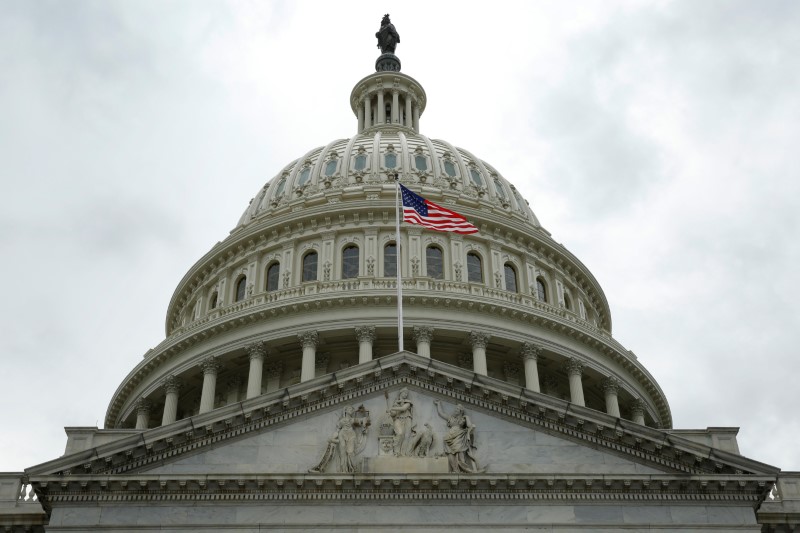By Yasmeen Abutaleb
Washington (Reuters) - Republican senators trying to repeal Obamacare are forming consensus to keep some of the U.S. healthcare law's taxes they long criticized, in hopes of delaying more drastic funding cuts, particularly to the Medicaid program for the poor and disabled.
First proposed by moderate Republicans, the idea is gaining traction among party members, according to five sources involved in or briefed on internal discussions. While no final decisions have been made, a sense of urgency has increased as Republicans draft a replacement bill to former President Barack Obama's healthcare law before Congress goes on recess on June 30.
But keeping some of the taxes in the Senate bill risks alienating conservatives. On Tuesday, 45 conservative groups and activists sent a letter to Republican Senator Orrin Hatch of Utah, the chairman of the Senate Committee on Finance, urging the Senate to repeal all Obamacare taxes.
One cornerstone tax that could remain is the net investment income tax, which imposes a 3.8 percent surtax on capital gains, dividends and interest, the sources said. The taxes most likely to be abolished directly impact consumers and the health industry, including a tax on health insurance premiums, the so-called Cadillac tax on high-cost employer-provided insurance and the medical device tax.
Another proposal being floated is to keep all the taxes from the Affordable Care Act, often called Obamacare, but to scale them back. A group of 13 Republican senators led by Majority Leader Mitch McConnell has not completed a full draft of the bill, but is sending pieces to the nonpartisan Congressional Budget Office to assess the impact of various provisions.
The CBO's assessment will help determine which taxes the Senate needs in order to pay for its replacement bill. It is not clear whether McConnell, or more conservative party members such as Senator Ted Cruz of Texas and Senator Mike Lee of Utah, are receptive to keeping some of the taxes.
"I think most of the taxes are going to go away," Senator John Thune of South Dakota, the Senate's No. 3-ranking Republican, said on Tuesday. "Our members are still having a conversation about if we want to make changes that are in the end going to require some additional revenue."
Spokesmen for McConnell and Cruz declined to comment. A spokesman for Lee said he wants Republicans to abolish every tax that was included in a 2015 Obamacare repeal bill that Obama vetoed.
Since Obamacare became law in 2010, Republicans have campaigned on repealing the program that extended insurance coverage to 20 million additional Americans through both subsidized private insurance and an expansion of Medicaid.
They have argued that the law is too costly and represents undue government interference in Americans' healthcare. President Donald Trump promised to eliminate the law on his first day in office, but Republicans, who control the White House, the House of Representatives and the Senate, have struggled to coalesce around a single plan.
Under Senate rules, their bill must replicate the $133 billion in savings projected by preliminary legislation that passed in the U.S. House of Representatives last month. That bill would end Obamacare's expansion of Medicaid in 2020, slash its federal funding by more than $800 billion over 10 years and eliminate most of the law's taxes.
Moderate Republican senators from states that expanded Medicaid, including Rob Portman of Ohio, Shelley Moore Capito of West Virginia and Dean Heller of Nevada, have proposed phasing out the expansion over a seven-year period, from 2020 to 2027, to give state governors more time to cut program costs. That timeframe also prevents senators, who serve six-year terms, from having to run for re-election when Medicaid cuts have been implemented, two former Republican Senate aides said.
Some of Obamacare's taxes could also be repealed later when Congress tackles new legislation overhauling the U.S. tax code, two current Senate aides said.
"There's no question that the current debate is not centered on eliminating all the taxes in Obamacare right now," Senator Tim Scott of South Carolina said last week.
Under a process called reconciliation, the bill needs at least 50 votes to pass, with Vice President Mike Pence casting the tie-breaking vote if needed.
In an interview with Reuters last month, McConnell said he did not yet know how he would get enough votes for an Obamacare repeal.
"Think of me with a Rubik's cube, sitting there trying to think about what combination will get you to 50," McConnell said.
